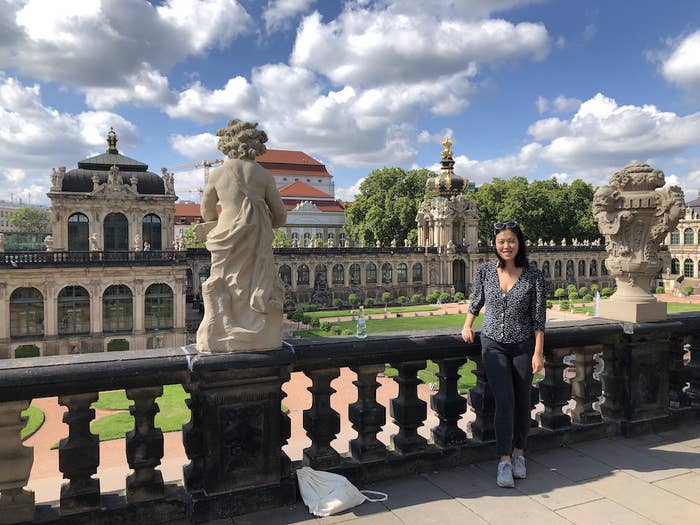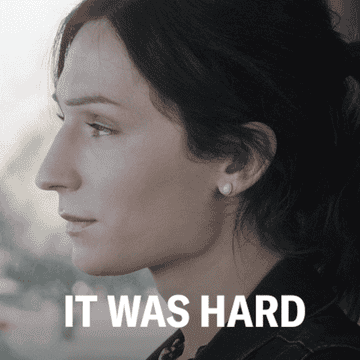I Left The US And Made The Move To Europe Four Years Ago — Here Are The Top 9 Things People Want To Know
Back in 2019, I moved from NYC to Berlin and wrote all about it. Since publishing my first post about my big move, I've received a lot of follow-up questions. People have been curious about the cost of living, how I scored my flat, how much German has actually been necessary to survive here, and my experience as an AAPI in Europe.

Now, with a few years of experience under my belt, I'm eager to answer all those questions and more. While the internet is full of great resources and informative sites, I've found — from personal experience — that honest, real-life anecdotes and tips from friends have proved the most helpful. So, consider me your American friend in Germany, and let's go through your questions!
1.Why did you move to Berlin (as opposed to Paris, Seoul, Mexico City, or any other city in the world)?
2.How did you get your visa? Was it hard?

ABC
Two years ago, I detailed how I got my work visa and described a few other popular options for settling in Germany.
Since then, I've become a freelance journalist and have gone through the process of getting the appropriate visa for it. I once described the process of getting a plain ol' visa through a German company as difficult; well, folks, this was exponentially more difficult.
That's because the freelance visa requires infinitely more items to bring to your appointment, and the list of requirements goes into little detail into what form those documents should take. For many people, that means venturing into the world of Facebook groups for help.
The hardest part is actually finding an open slot for a visa appointment, though. To score one, I set up a morning routine of refreshing the Berlin Immigration Office page. I've even heard of plug-ins floating around online that automatically check for appointments for you.
My visit turned out to be additionally unnerving thanks to a case worker who not only berated me for my request that we speak in English, but also asserted that my eyes were "black, not brown" and proceeded to note it on my official visa.
All to say, my visa application experience had a high amount of variability for a delicate process that you'd hope would be standardized to a tee. As with job interviews, the best solution is to simply over-prepare on all fronts — documents you'll need, leaving with an hour to spare, bringing a translator for you, etc.
3.What was your experience finding an apartment? Would you recommend furnished flats?

Fox
First things first: A lot of things have changed since I moved to Germany in 2019. Most significantly of all, the Russian war in Ukraine has skyrocketed gas prices, and along with supply chain issues caused by COVID-19, led to inflation across the board.
The housing shortage hasn't eased up, either. While refugees and other displaced people have been bearing the worst of the housing shortage, it's also been affecting residents in big ways. One friend who moved from NYC to Berlin has been applying for flats since last summer, to no avail.
Simply put, the low cost of living and rents I once bragged about are, at least for now, no more.
And sadly, there aren't too many secret avenues for finding a flat, and you'll likely need to follow the usual procedure of applying for viewings and submitting a standard application to get one. Sure, having more money might open up the pool of apartments available to you, but the truth is, there's not a single category of housing that isn't in high demand. Many local news outlets report that in Berlin, where I live, rents have increased by almost a third in just three months.
Here's where you can breathe a small sigh of relief, though: If you're willing to live with a roommate or two, your chances of scoring a room are much higher. If you're willing to pay for a furnished apartment that's significantly more expensive (meaning you pay 1,500 EUR 1-bedroom as opposed to 1000 EUR 1-bedroom), then you're also in luck. And if you can, I'd advise you to plug yourself into virtually any affinity group on Facebook (say, a group for queer people of color, or Italian-Americans living in Berlin, or, I don't know, engineers who love kombucha). I've heard a disproportionate number of success stories of friends finding flats there.
My personal moment of luck came when I was able to secure a last-minute viewing that was scheduled within hours of receiving the email. Immediately after the viewing, I submitted my complete application including a letter from my previous landlord confirming I have no rental debts. You can check out the full list of necessary forms here.
Sometimes, it's just about good timing.
4.Do I need to learn German now? Should I learn some before moving?

Netflix
I took courses for three months in New York before moving to Germany. It was time-consuming and expensive, and ultimately, I didn't need to speak a single word of German before moving here. But it was worth it.
It helped me not only feel confident in public spaces but also got me into the mindset of a responsible visitor who's there to experience and engage with a new-to-me culture — not barge in on it like the Kool-Aid man.
As an Asian American, I also felt that learning German would give me a level of "protection" in a predominantly white country. Growing up in both Europe and the US as a person of color, I've long dreaded the look of instant judgment that sketches itself on many strangers' faces as soon as they meet my eyes. Knowing the local language has always felt like a disarming charm I know I can conjure to my defense at any time.
For most other people: You can survive on very little German — but to thrive, feel independent when dealing with the bureaucratic logistics of daily life, and truly root yourself to the city, I'd recommend making a plan for learning German up to level B2.
5.How did you make friends?

Adult Swim
Making friends in Berlin is no harder than it is in any other city. All to say, it's pretty dang difficult.
Before my move, I asked all my friends in NYC to introduce me to people they knew in Berlin — even people they themselves may not know well. From my years of networking, I've learned that even the weakest links can guide you to pretty sincere relationships.
I also downloaded Bumble BFF, the "friend" iteration of the popular dating app, and even reached out to people on LinkedIn.
If the idea of doing any of the above things makes your butthole tighten up and your eyebrows curve up into absolute cringe, then you're not alone. Admitting that you need friends and opening yourself up for rejection and — ew, writing a little three-sentence bio about yourself and your little hobbies — is one of the most vulnerable things you could do. It's like buying a pair of jeans on sale, purposefully leaving the tag on, and wearing it to your next work party. But if doing that could get you a friend whose company you genuinely enjoy, who can help you explore your new city, and importantly, help you try out more menu items than you could alone, then, honestly, I'd do that, too.
6.What's the cost of living like?

PBS
For most people (myself included), the basic cost of living that'll get you a room, food, Wi-Fi, and a phone plan, is around 1,000 euros per month. Of course, that figure has a high degree of variability, especially if you have a higher-than-average rent. (You can read more about typical expenses here.) But for the most part, Berlin has a lower cost of living than New York, Sydney, London, and Los Angeles.
The second biggest expense is usually groceries, which a very informal poll of close friends tells me averages between 40 and 60 euros per person per week. Germany basically popularized the idea of the modern discount supermarket, so eating in and cooking your meals are easy ways to save money here.
Another fun way to save money? Get a bike instead of springing for a monthly public transit pass, which in 2023, would set you back 50 euros a month. Berliners will never stop complaining (about the bike lanes), but I find them adequately flat, well-marked, and safe to bike on!
7.How do taxes work?
8.What has been your experience as an AAPI person been like? Have you been able to find community around that?

ABC
I'll spend another entire post talking in-depth about this, but what I'll say for now is that it's been a rollercoaster of a ride. Moving here and having elementary conversations about equity and race felt frustrating, anxiety-inducing, and life-sucking. Conversations I thought I was done having — about why it's not ok to ask someone where they're really from, use the N-word even if it's in a song — came up a little too frequently. And to be completely honest, the fact that I hadn't heard them in so long meant I wasn't prepared to address them.
What's helped has been finding a community of other POC and allies navigating these situations in parallel. By surrounding myself with like-minded folk, I've been able to transform many negative interactions into simply another thing to bond us and discuss over an order of tapas at Bar Raval.
9.Where do you buy Asian groceries? Is it easy to get all the ingredients together for kimchi stew?

Okay, so maybe my mom asked me this question. But I'll answer it anyway because I kind of wish I had known the answer to it earlier. If you're like me, and food is important to your quality of life and overall mental health, then I'm happy to report that at least in Berlin, there are a fair number of grocery stores catering to various genres of food.
Of course, many ingredients are sold in Costco-sized bags, cost more than they would back home, and might not be the freshest — but for every Tunisian soup, Korean oxbone soup, and hotpot dinner I've wanted to try, I have never had to look too far to find the right ingredients for it.
And yes, Mom, high-quality kimchi is readily available in my neighborhood and through my Asian groceries delivery app, GoTiger (not sponsored).

